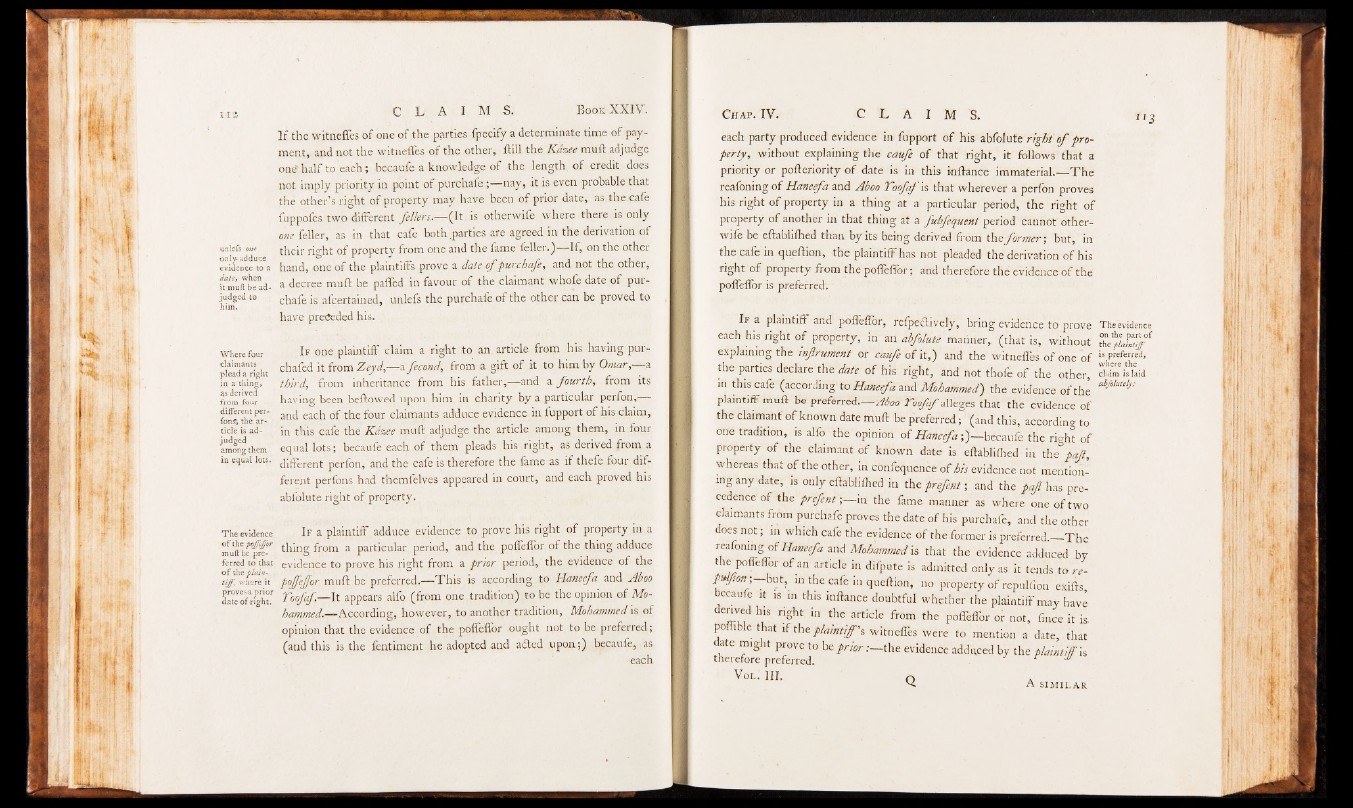
unlefs one
only1 adduce
evidence to a
date, when
it mu ft be ad*
judged to
him.
Where four
claimants
plead a right
in a thing,
4S derived
from four
different per-
fon£, the article
is adjudged
among them
in equal lots.
The evidence
o f the poffeffor
muft be preferred
to that
I f the witneffes of one of the parties fpecify a determinate time of payment,
o f the plain- .
tiff, where it
proves a prior
date o f right.
and not the witneffes of the other, ftill the Kdzee muft adjudge
one'half to each; becaufe a knowledge of the length of credit does
not imply priority in point of purchafe ;—nay, it is even probable that
the other’s right of property may have been of prior date, as the cafe
fuppofes two different fellers.—(It is otherwife where theie is only
one feller, as in that cafe both .parties are agreed in the derivation of
their right of property from one and the fame feller.) If, on the other
hand, one of the plaintiffs prove a date o f purchafe, and not the other,
a decree muft be palled in favour of the claimant whole date of pui-
chafe is afcertained, unlefs the purchafe of the other can be proved to
have preceded his.
If one plaintiff claim a right to an article from his having pur-
chafed it from Zeyd,—a fecond, from a gift of it to him by Omar, a
third, from inheritance from his father,—and a fourth, from its
having been bellowed upon him in charity by a particular perfon,—
and each of the four claimants adduce evidence in fupport of his claim,
in this cafe the Kdzee muft adjudge the article among them, in four
equal lots; becaufe each of them pleads his right, as derived from a
different perfen, and the cafe is therefore the lame as if thefe four different
perfons had themfelves appeared in court, and each proved his
ablolute right of property.
I f a plaintiff adduce evidence to prove his right of property in a
thing from a particular period, and the poffeffor of the thing adduce
evidence to prove his right from a prior period, the evidence of the
poffeffor muft be preferred.—This is according to Haneefa and Aboo
Yoofaf.—It appears alfo (from one tradition) to be the opinion of Mohammed.—
According, however, to another tradition, Mohammed is of
opinion that the evidence of the poffeffor ought not to be preferred;
(and this is the fentiment he adopted and adled upon;) becaufe, as
each
each party produced evidence in fupport of his abfolute right o f property,
without explaining the caufe of that right, it follows that a
priority or pofteriority of date is in this inftance immaterial.—The
reafoning of Haneefa and Aboo Yoofaf is that wherever a perfon proves
his right of property in a thing at a particular period, the right of
property of another in that thing at a fubfequent period cannot other-
wife be eftablilhed than by its being derived from the former; but, in
the cafe in queftion, the plaintiff has not pleaded the derivation of his
right of property from the polfeffor; and therefore the evidence of the
poffeflor is preferred.
I f a plaintiff and pofieffor, refpedlively, bring evidence to prove The evidence
each his right of property, in an abfolute manner, (that is, without
explaining the infirument or caufe of it,) and the witneffes of one of is preferred,
the parties declare the date of his right, and not thofe of the other ckhn inlaid
in this cafe (according to Haneefa and Mohammed) the evidence of the
plaintiff muft be preferred.— Aboo Yoofaf alleges that the evidence of
the claimant' of known date muft be preferred; (and this, according to
one tradition, is alfo the opinion of Haneefa;)— becaufe the right of
property of the claimant of known date is eftablilhed in the paß,
whereas that of the other, in confequence of bis evidence not mentioning
any date, is only eftablilhed in the prefent; and the paß has precedence
of the prefent;—in the fame manner as where one of two
claimants from purchafe proves the date of his purchafe, and the other
does not; in which cafe the evidence of the former is preferred.__The
reafoningof Haneefa and Mohammed is that the evidence adduced by
t e poffeffor of an article in difpute is admitted only as it tends to re-
p fio n ,— but, m the cafe m queftion, no property of repullion exifts
becaufe it is m this inftance doubtful whether the plaintiffmay have
derived his right in the article from the poffeffor or not, fence it is.
ponible that if the plaintiff's witnefles were to mention a date, that
date might prove to be prior .-—the evidence adduced by the p la in tiffs
therefore preferred. r M
Vol. HI. Q A S IM IL A R